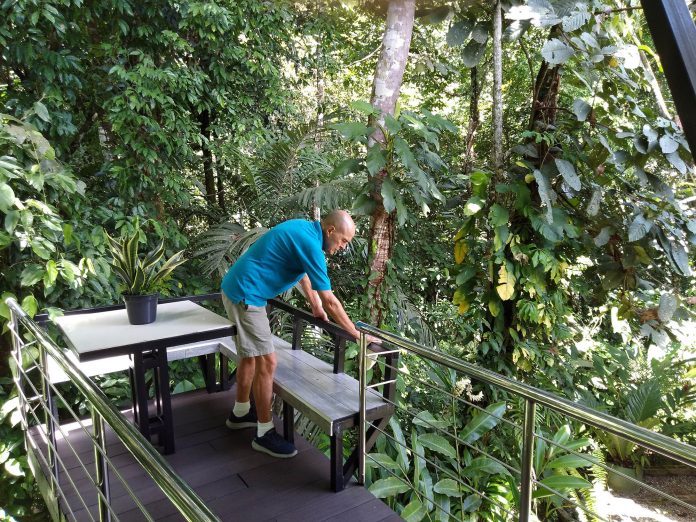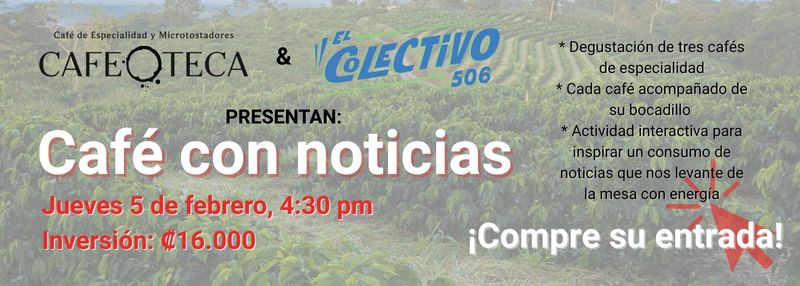The terrace of our living and dining room is the last frontier between human hands and the forest. There, with the Lajas Ravine at our feet, our spirits begin to rise in preparation for the next day.
Our days abound with sensations and emotions. There are seldom days from which we do not recall at least one event or situation—usually good, although there are also bad moments.
We are Ana Mercedes Espinoza Esquivel and Juan Fernando Cordero Arias, and throughout our life together we have taken on many challenges. We will celebrate 49 years of marriage on July 12, and six more years of courtship. The most recent of these challenges was becoming small business owners in the area of rural tourism, a totally new experience for us. But there is nothing that human beings cannot learn if they approach it with dedication and enthusiasm.
A visibly satisfied and grateful client leaving the lodge is possibly our greatest joy, because it is proof of a job well done by all the staff. At the same time, this presents us with the challenge of maintaining quality standards and always looking for opportunities for improvement. We are also very pleased with the positive comments that guests write after their departure, who prefer to express their satisfaction with their stay in this way.
We are satisfied to offer work to residents of the community and to contribute as much as we can to the development of the area. A constant in our relationship with guests is to encourage them to contribute to the local economy by visiting commercial establishments and tourist sites in Ojochal and its surroundings. And we thank them for choosing Yabá Chiguí Lodge, which is a distinctly Costa Rican undertaking.

Before retirement
Before this phase of our lives, our previous personal and professional activities took place in totally different settings. Ana Mercedes, an agronomist by profession, with doctoral studies in plant virology in England, worked for 35 years as a researcher at the University of Costa Rica. Juan Fernando, public administrator and journalist, worked in various state institutions and at the newspaper La Nación for a total of 47 years of professional life. In addition, together we performed diplomatic tasks on behalf of Costa Rica in England, Singapore and India.
We were born in Heredia and lived most of our lives in Santa Lucía de Barva de Heredia. We always worked in San José; we have a son and two daughters, plus four grandchildren. There were always many responsibilities to handle, with full-time jobs and the duties involved in raising children. Those were other times, of course, with smaller cities and less traffic, which allowed us to do 40-minute commutes that today would take up to two hours.
Ana’s work as a researcher, which demanded a lot of dedication and scientific rigor, and Juan Fernando’s as a journalist, requiring long hours and availability on weekends and holidays, called us to achieve and maintain a delicate balance. We managed this for many years thanks to our respect for our occupations and our solidarity with each other.

About 16 years ago, we visited the Costa Rican South Pacific for the first time and came across the amazing town that is Ojochal. It was love at first sight: this is the place we wanted to live. We arrived in that community by accident, because when we started the trip we only had a slight idea of the town of Uvita, well known for its Ballena National Park. However, we decided to go a little further south and 14 kilometers later, thanks to a little sign that we almost missed, we decided to turn in, just “to see what was there.”
If we had a travel blog on that occasion, we might have written something like this about Ojochal: a dirt road as the main entrance, a placid stream that invites us to continue, a few very scattered houses, a few shops, different small paths to follow, bucolic landscapes and generous nature, with the coastal mountain ridge as an imposing guardian.
Many years have passed since then. Possibly for the better, those years did not pass through Ojochal. It continues to be a small town with no major urban aspirations, no airs or pretensions, where everyone greets each other without knowing each other. It’s ideal for rest and relaxation, and a coveted gastronomic paradise. For us, a few more vacation visits were enough to finalize the purchase of a piece of land and await the arrival of our retirement.
Juan Fernando joked that the first thing he would do once retired was to go sit every day in Heredia’s central park to talk with his retired colleagues. He didn’t even do that once. Instead, soon after retirement, we began to refine the idea of the small lodge to keep us busy: an active retirement, with 134 years of age between us.

Yabá Chiguí means “mountain” in the Boruca language, one of the indigenous groups of the region. The lodge, which began operations in May 2016, uses original architecture to maximize sustainability and favor intimate contact with nature.
It has four bungalows and a colorful garden with lush tropical species. Together with the stream and the forest that surround the property, the setting promotes tranquility, as well as aesthetic and spiritual enjoyment, experiences that guests appreciate and mention the most.
So what is a day in the life of that active retirement like?
With guests at the lodge, our activity begins around 5:30 in the morning. No need for rooster or alarm clock: often, the howler monkeys are the ones in charge of that first warning, between 4:30 and 5 am. If there are no customers, we take our first steps around 7 am.
Customers’ breakfast is the number one priority. Although we offer the same dish for everyone each morning, we pride ourselves on having a menu of eight different options, so that no one will repeat breakfast during stays of several days.
At 6 am our main assistant, Vivian, arrives to take charge of the kitchen. Later, when everything is sorted out on the ranch where breakfast is served, she attends to the rooms and other tasks, such as opening the unoccupied bungalows early to ventilate them or turning on the dehumidifiers if there has been a lot of night rainfall.
We serve the food and personally attend to the guests while they have breakfast and give them information or guidance on various topics. Likewise, we share with them anecdotes and life experiences over juicy after-dinner meals.

We have two more helpers who come once or twice a week, as required: Carlos, for the garden and maintenance work, and Doña María, who takes care of our house and sometimes reinforces Vivian. There is always a lot to do.
Clean the pool and its surroundings. Measure the physical-chemical parameters of the water and apply salt when necessary. Cut the organic waste that goes to compost. Apply the COVID-19 protocols. Collect leaves from trails and roofs. Attending unforeseen suppliers and visitors. Do general cleaning. Wash and dry clothes. Water the indoor plants (we used to say we had a nursery on our ranch; now we brag that we have a ranch inside a nursery. There are 81 plants to date!). Buy products from small farmers who come once a week to a fair in town. Finally, at the time of this writing, we also lead a municipal management group of neighbors working to fix the street and collect funds for the purchase of gravel.
All of the above is possible thanks to the invaluable support of our daughter Sofia from Ireland, where she now lives. She takes care of the reservations, our webpage and social media, marketing, and other administrative tasks.
During the high season, with more guests on hand, every day is the same. We often forget what day or what date it is, because our tasks do not respect calendars. The difference in the type of work, but not in the intensity, occurs when the low season arrives and the occupancy of the lodge is reduced. But that season’s rains also increase maintenance tasks and make them more difficult. It is the season to protect metals, woods, and textiles from moisture.

Fortunately, after the storm, calm always arrives. When every possible guest request has been fulfilled, and especially when all our guests have gone to bed, when the rich surrounding biodiversity does not manifest itself with a surprise visit to one of the rooms of a threatening but inoffensive spider—at that point, our hour of rest arrives.
There’s no shortage of fatigue, both physical and mental. But when that happens, we smile and ask each other a question that helps banish our discomfort: “We said we wanted to stay busy, right?”
Stories created under the “Directory 506” byline are a joint effort between El Colectivo 506 and entrepreneurs and organizations that participate in our national directory of rural tourism. This text was created by Juan Fernando Cordero Arias and Ana Mercedes Espinoza Esquivel of Yabá Chiguí Lodge, Ojochal.
For more information about Directory 506, send us a WhatsApp message at 8506-1506 or write to us at [email protected].







